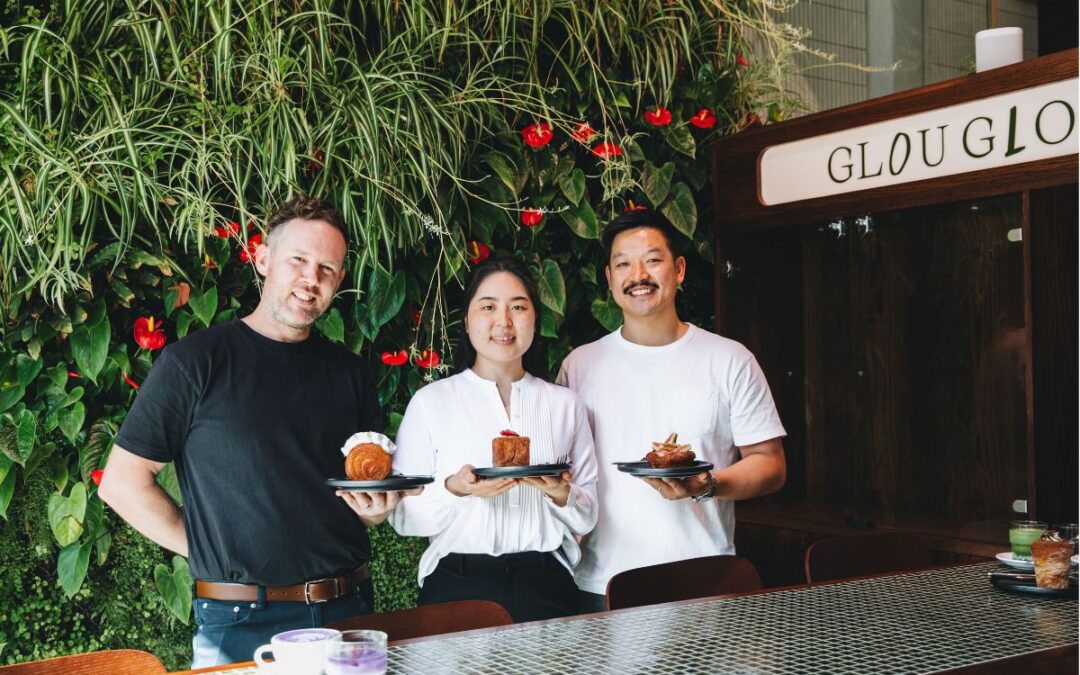
Photo credit:- Phoebe Mackenzie.
What started as a boutique catering company in 2012 is now a multi-armed hospitality business that has quietly re-shaped parts of Wellington’s food scene.
Food Envy’s story is one of deliberate expansion, hands-on problem solving and a refusal to let tough economics stifle creativity. Co-directors, Mike Ny and Taz McAuley talk about the decisions that changed everything — a commercial kitchen in Te Aro, stewardship of The Atrium, and Glou Glou, a café designed to flex into a wine bar by night.
“From day one when Taz founded Food Envy we wanted to build a business that could deliver exceptional moments — whether that’s a boardroom lunch for 20 or a gala dinner for thousands of guests,” says Mike. “We never chased scale for the sake of it. Everything we’ve added has been about expanding what we can create rather than changing who we are.”
A Kitchen that Changed the Game
The first major turning point came in 2020, when Food Envy invested in a purpose-built commercial kitchen designed by Mike, in Te Aro. In the middle of the Covid pandemic, that might have seemed risky. For Mike and Taz, it was strategic.
“We needed capability to meet new demand — and to be flexible,” Mike explains. “That kitchen let us move from small boutique events to reliable large-scale catering and high-volume delivery without losing quality. It was the backbone for the rest of our growth.”

Taz adds: “Having our own kitchen wasn’t just operational; it changed how we pitched partnerships. Other businesses could rely on us to deliver during disruptions — that built a huge amount of trust.”
Reimagining The Atrium
In 2022 Food Envy took over event management of Wellington’s The Atrium in partnership with The Exchange. What had been a conventional event space became a high-capacity, flexible venue in the heart of Wellington’s hospitality precinct.
“We saw The Atrium as a blank canvas,” says Taz. “We rethought layout, back-of-house flow, and how food and beverage could be a central part of the event experience — not an afterthought. The space now adapts quickly for corporate celebrations, weddings and pop-ups. That adaptability gives us more ways to keep revenue strong across seasons.”
Mike points to the venue’s flexibility as business insurance. “When the market shifts, you need options. The Atrium lets us move between daytime functions and evening events with minimal friction.”
Glou Glou: a Café that becomes a Bar
In 2024 Food Envy launched Glou Glou, a stylish daytime café serving espresso, specialty tea lattes and house-made pastries. The clever part? The design and operations were built from the start to evolve into an evening wine bar which it will, later this year.
“Glou Glou was never meant to be only a café,” Taz says. “We designed the layout, menu and staff training for a day-to-night switch. It optimises the use of the site and deepens our Food & Beverage offer without reinventing the wheel.”

Mike notes the commercial logic. “A space that earns sun-up to night is simply better business. Daytime trade builds relationships with locals; evenings bring events and a different customer demographic. It’s about squeezing more value from the real estate.”
Collaboration and Community as Core Pillars
What sets Food Envy apart, the pair say, is not just expansion but the way the team collaborates with other operators and with the local business ecosystem.
“We stepped in during COVID to help deliver orders for others and we still partner with event companies and local suppliers today,” Taz explains. “Those relationships are reciprocal — they’ve helped us scale and given partners new ways to deliver their own services.”
Mike credits business development support for accelerating professional growth. “Working with WellingtonNZ’s Business Growth team opened up practical support,” he says. “Importantly, completing The Icehouse Owner Manager Programme was a game-changer. It sharpened our commercial focus and gave frameworks for sustainable scaling. We learned how to invest in growth without losing control.”
Practical Thinking for a Tight Market
Food Envy’s leadership is pragmatic about the current economic climate: diversify, protect margins, and invest where the returns are clear.
“During cost-of-living pressures we stayed close to customers — learning what they value and simplifying offerings where needed,” Mike says. “We also focused on operational efficiencies so we could keep quality high while managing costs.”
Taz emphasises the usefulness of small, tactical investments. “Smart equipment, better kitchen flow, and staff training pay off quickly. We treat every capital spend as a way to future-proof the business.”
What’s Next ?
Looking ahead, Food Envy plans to build on the day-to-night model, tighten partnerships across the events ecosystem, and continue testing concepts that make the most of their spaces.
“We’re not chasing a bigger footprint for its own sake,” Mike says. “We want more ways to make meaningful experiences — and to do that in a way that’s commercially sensible and rooted in the Wellington community.”
Taz sums it up: “Hospitality is about people. If you get the food, the service and the place right, everything else tends to follow.”

